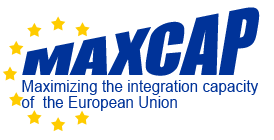The MAXCAP Working Paper No. 32 “The Limits of EU Enlargement Linked to Citizens’ Perceptions of Past and Future Enlargements” by Elitsa G. Kortenska has been published. You can download the Working Paper here.
While the Eastern enlargement of the EU was met with favorable public attitudes in member states at the time, today, the potential membership of countries in the Western Balkans, and even more so Turkey, meets strong public opposition. The review of public attitudes provides inconclusive explanations for the shift to negative public opinion trends since 2004/2007, motivating us to seek understanding through a dis¬cursive approach studying citizens’ views. This paper summarizes the results of six bottom-up, Q method discourse studies in Germany, the Netherlands, Poland, Bulgaria, Serbia, and Former Yugoslav Republic of Macedonia (FYROM). The comparison of 21 discourses from these six countries reveals the existence of groups of narratives that support enlargement, but also groups that oppose it. Analyzing the arguments within and across narratives, the paper outlines the limitations and opportunities for EU enlargement, stemming from the way European citizens/voters have perceived the process so far and how they envi¬sion it in the future. The identified discourses are more optimistic about future enlargements than mass surveys suggest. Nevertheless, the results clearly point to the lack of deliberation and communication on enlargement as a major problem of previous and current enlargement rounds. The real danger for future enlargement does not stem from negative opinions per se. Rather, enlargement process nowadays is at risk due to the absence of a bridging discourse that echoes across societies and elites and is rooted in common European values and ideals. The paper’s policy recommendations emphasize that deliberation, consulta¬tion, and communication leading to a balanced public and political domestic debate are required at early stages of the process.
It is the objective of the MAXCAP Working Paper Series to disseminate the research results of the research consortium to a wide audience, including the academia as well as the general public. Thus, all Working Papers can be downloaded free of charge from our website.

